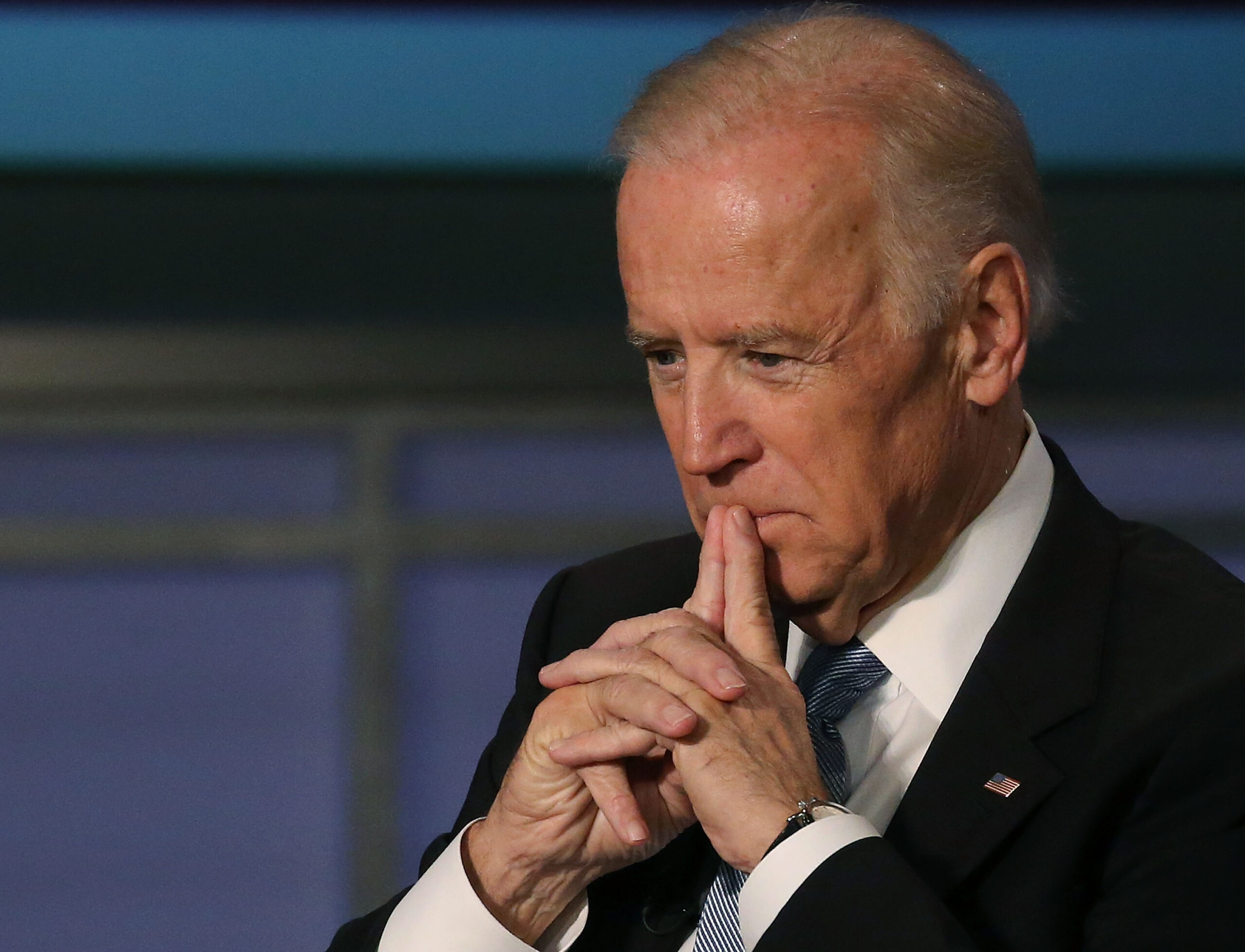Joe Biden is the presumptive Democratic Party nominee for the 2020 presidential election. In less than a month, Biden will take to the virtual stage and accept his party’s nomination – making it official. Although the Democratic race is over, it is still a worthwhile endeavor to scrutinize the nominee in order to better visualize what an actual Biden presidency will look like.
While Biden has been in American politics for over 40 years, there is still some evolving aspects to his personal politics that remain unclear. Whereas Biden has remained steadfast on some issues, (such as his commitment to maintain for-profit health insurance) there are other areas that deserve more exploration. One particular area that deserves renewed attention is his relation with Corporate America.
If Biden wins in November, he will be tasked with leading the country’s approach to a number of different industries. One such sectors will be the seemingly ubiquitous and all-powerful multinational mega corporations.
Right around the time Joe Biden entered into politics, the trajectory of positive corporate gains was already being established – though still in its infancy. Over the last +50 years, however, their can be no doubt that large American businesses have seen a boom across a number of different metrics. From corporate profits, to worker productivity, to tax rates… Many of the economic markers used to assess economic health have advantaged the corporate class. More worrisome, though, is that these economic advantages have come at the expense of the working class.
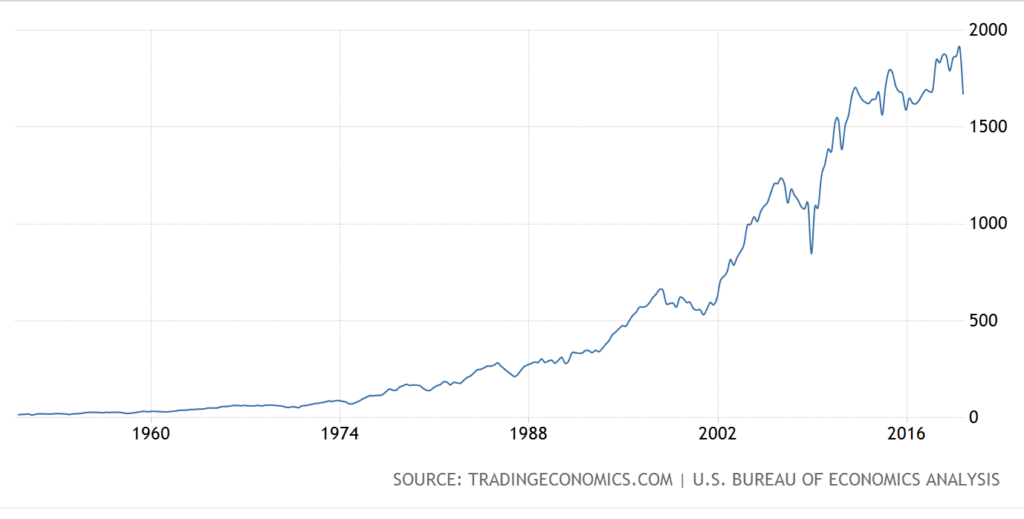
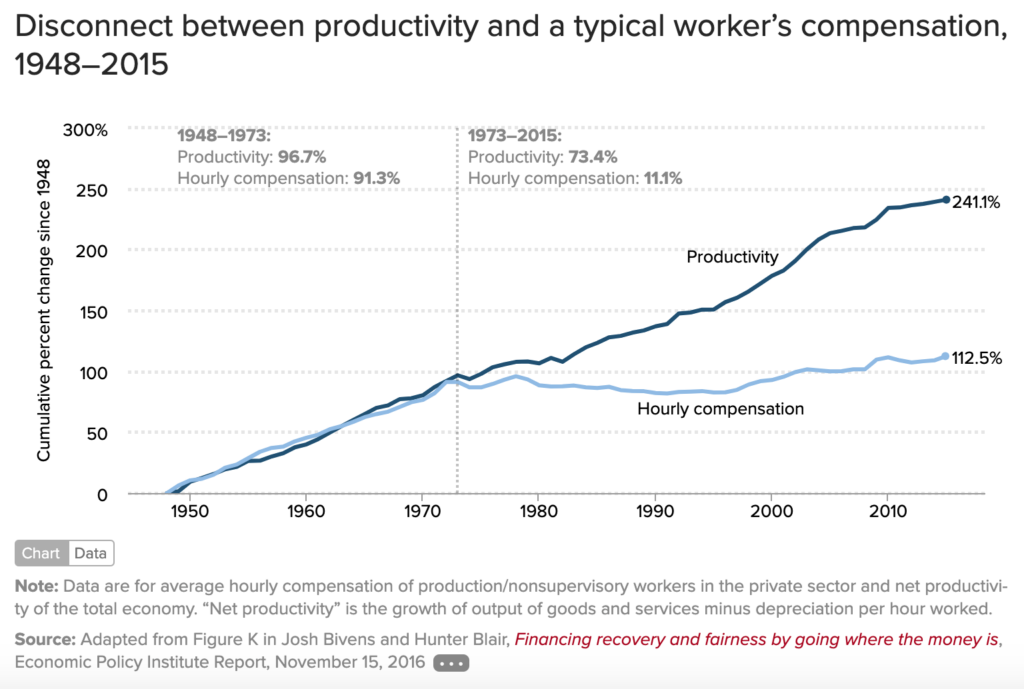
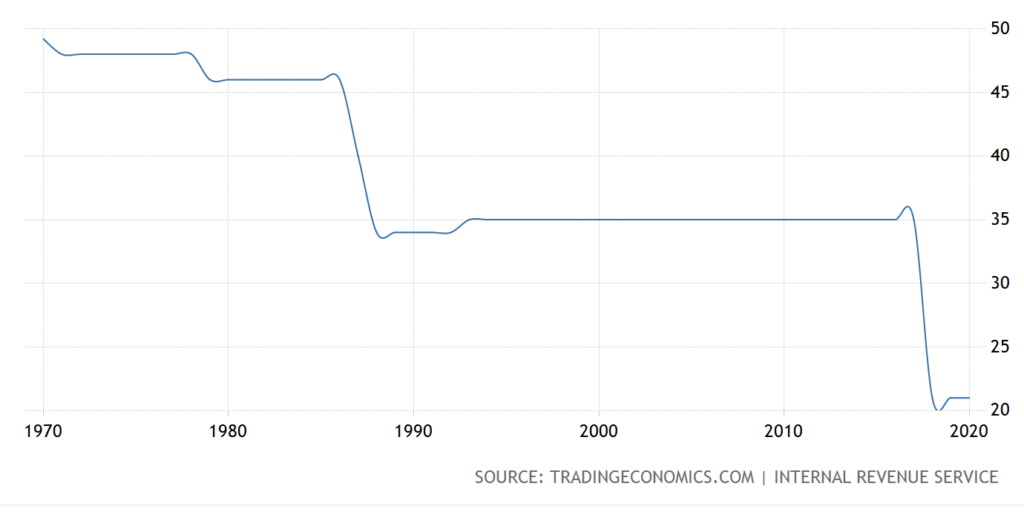
So the question that is the basis for this entry is simple. How would a Joe Biden presidency handle Corporate America? Now that it is established that Big Business has a uniquely dominant position vis-à-vis the working citizenry, can we expect Biden to change this reality or preserve it? What does Biden’s distant past and recent campaign promises tell us about how he will approach Corporate America?
Before I take on this task, I think it’s important to layout the criteria Biden should be assessed by. While not exhaustive, the following questions will provide a solid basis for addressing the underlying premise. Under a Joe Biden presidency…
- Will corporate tax policy change?
- What will be corporations responsibility to workers?
- Will corporate regulations be expanded or curtailed?

Joe Biden’s Past
To be terse, Biden’s past suggests his presidency will not be a hindrance to the unfurling power that Corporate America yields. Biden history has, at best, been defined with a hands off approach to corporate regulation. At worst, he has actively sided with Big Business.
For example, since at least the 1990s, Joe Biden has been allied with large corporations and financial institutions on the issue of bankruptcy. Biden has often supported measures to restrict the ability of average Americans from declaring bankruptcy. His pro-Corporate America support culminated in the passage of the 2005 Bankruptcy Abuse Prevention and Consumer Protection Act. This law, often referred to as the Bankruptcy Bill, established stricter requirements for declaring bankruptcy for average Americans. In essence, this made it harder for low wage families and individuals burdened with student loans to declare bankruptcy.
At the same time, Biden pushed for the deregulation of the banking and credit card industries in order to maintain political power in his corporate-friendly home state of Delaware. (See: Riegle-Neal Interstate Banking and Branching Efficiency Act or the Financial Services Modernization Act.) Whether it was the repeal of Glass–Steagall, or his naked lobbying on behalf of MBNA Corporation, Biden has a well-established history of carrying water for Corporate America. Unfortunately, many of Biden’s decisions directly led to the financial crash and economic recession of 2008.
“I wish I had never voted to repeal the legislation limiting [what] banks could do: Glass-Stegall.”
It should be noted that Joe Biden does have some regrets about positions he has taken in terms of regulations on corporations. In a December 2016 speech, Biden lamented his previous support of the repeal of Glass-Stegall; he also wished the Obama Administration put more pressure on Corporate America to be more responsible. Nevertheless, Biden is what his record shows. Time and time again, Biden has devotedly used his position in office to help out large corporations and financial institutions. More troubling, though, is that Biden’s fidelity to Corporate America has routinely harmed the middle class and working poor.
It is natural to wonder if Joe Biden has changed his political heading such that, if elected president, he would not be keen to make these mistakes again. To undertake this challenge, then, we must look to his post-Vice President life in politics. Specifically, we must reference his current campaign for answers.
Biden’s Campaign Rhetoric
On paper, Joe Biden’s campaign platform is unmistakably tougher on Corporate America than his past. A quick glance at his campaign website and you’ll find many appeals to working families and small business. And even though not heavy on the details, Biden even suggested that he would demand more from Corporate America and “[reverse] some of Trump’s tax cuts for corporations” such that they are made to pay their fair share. In several speeches he has favored a progressive tax code which raises the top corporate income tax rate from 21% to 28%.
Additionally – and even more stunningly – the Biden campaign even supports the reform of the “Bankruptcy Bill” that he vocally supported back in the early 2000s. On his website, Biden embraced former presidential candidate Sen. Warren’s “Fixing Our Bankruptcy System to Give People a Second Chance” policy. With numerous rhetorical shifts against Corporate America (and in favor of the working class), it is no wonder why Barack Obama and others have called Biden’s presidential platform “the most progressive” in history.
Unfortunately, what Biden promises on paper is suspiciously different than what he says to members of the corporate class.
In a 2018 speech at a Brookings Institution event, Biden returned to defended wealthy individuals and corporations. He cheerfully exclaimed, “I don’t think 500 billionaires are the reason why we’re in trouble…. And the folks at the [economic] top aren’t bad guys.” This rhetoric is in direct opposition to the public-facing statements expressed by his campaign.
Further adding to this premise, is Biden’s ardent attachment to status quo economic policy. At several points during his campaign – including at his campaign launch – Biden has tried to win over voters by promising a “return to normalcy.” Which is to imply that the normal circumstances of the US economy, in which corporations maintain vast unregulated power and influence, will be re-stabilized after the supposedly erratic Trump presidency.
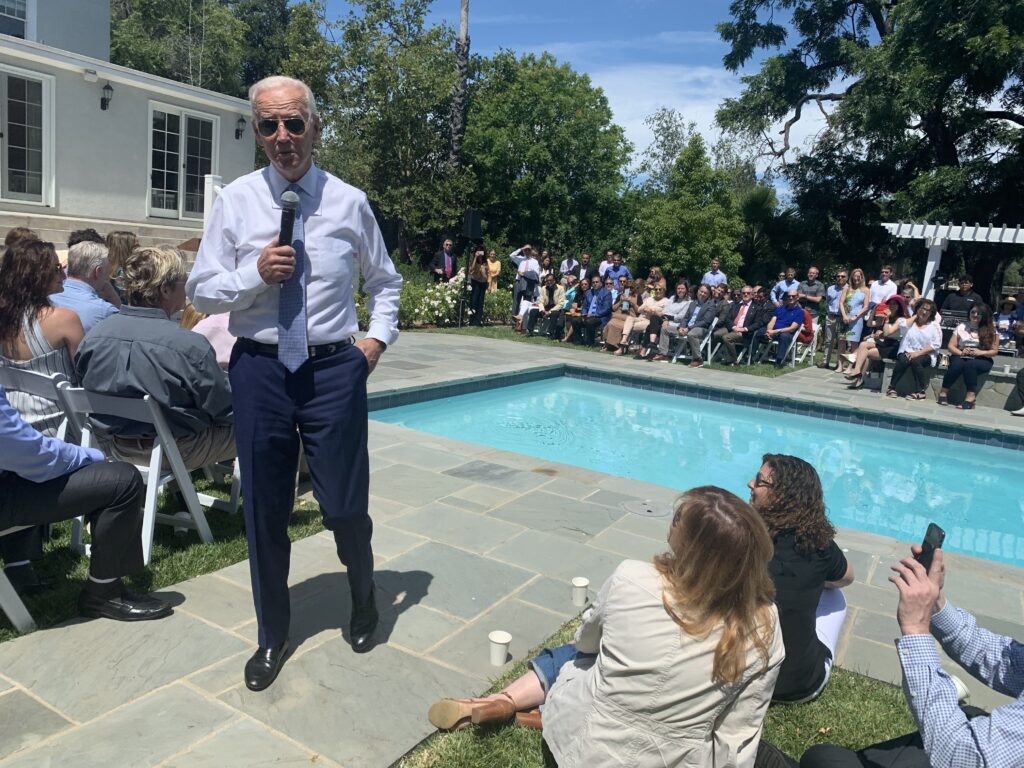
To theorize that a Biden presidency will handle Corporate America any differently than the politician did in the past is, at best, unfounded. In fact, Biden himself promised that nothing will fundamentally change. While this was in the context of tax reform and the standard of living of the rich, this sentiment might equally apply to the rest of his platform. At a fundraiser in the early stages of his campaign, Biden told a horde of wealth individuals the following:
“The truth of the matter is, you all, you all know, you all know in your gut what has to be done. We can disagree in the margins but the truth of the matter is it’s all within our wheelhouse and nobody has to be punished. No one’s standard of living will change, nothing would fundamentally change.”
Lastly, and potentially more damaging, is a recent overture Biden made to another group of wealthy individuals and corporate figureheads. On a July 2020 fundraising call, Biden calmed corporate concerns that he might enact legislation to rein in their power. In direct contradiction with his campaign rhetoric, Joe Biden assured that he would not propose regulations to handle Corporate America if elected president. His campaign provided the press with a read out of the conversation:
“I come from the corporate state of America, many of you incorporated here. It used to be that corporate America had a sense of responsibility beyond just CEO salaries and shareholders. Corporate America has to change its ways. It’s not going to require legislation. I’m not proposing any. We’ve got to think about how we deal people back in.”
The important part lays bare. Biden does not have any inclination to regulate the unchecked dominance and adverse prosperity of Corporate America.
As David Sirota pointed out, Biden has a pattern of holding mutually exclusive positions at the same time. At one instance, he openly embraces corporate expansions. And at the same time, he pats his own back for being for the little guy. Out of one side of his mouth he promises to adopt bold progressive economic legislation. However, out the other side, he’s privately telling his corporate benefactors that he wouldn’t dare obstruct their interests with needless regulations or tax increases. One could laugh at this absurdity if the stakes of the 2020 presidency were not immeasurably high.
Returning to the central question of this piece, the answer seems rather obvious. Joe Biden will not be a progressive blockage of the increasing power of Corporate America. Any change in tax policy will likely be a paltry adjustment. Corporations will continue to maintain their domineering status over workers; and as a consequence, workers’ wages and benefits will remain stagnant. Additionally, Biden will forgo substantial regulations such that “normalcy” is preserved for the massively successful corporate sector.
Despite campaign promises and task force unity, we should not expect a Biden presidency to be economically progressive – at least not when it comes to the relationship between Corporate America and average Americans. One can certainly point to instances where Biden signals his commitment to reforming the corporate class. But those instances are just signals, not concrete commitments or actions.
Of course, individuals can choose to believe Biden’s guarded statements made in public while ignoring honest ones said in private; but they do so at their own peril. I advising believing Biden when he’s talking with people who have equal or more power than he does. Which is to say, when Biden goes to genuflect to mega-donors or business executives, that’s when he’s being honest, and that’s when we should believe him. Joe Biden will not take on the power, greed, or influence of Corporate America. As citizens enter into the voting booth this November, this fact should be known.
